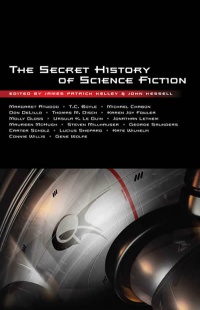I just came across a bizarre article at TechRepublic.com that claims “sports is a better form of entertainment than science fiction.” Now if that’s not one of the strangest cases of comparing apple to oranges I’ve ever seen, I don’t know what is. So you’re a sports fan, and you want to demonstrate the good things about sports, as you see it, so you want to make comparisons with some other sort of interest, so you pick…… science fiction? If you’re talking about sports in general (rather than a particular sport like hockey or basketball), then wouldn’t it make more sense to contrast it with other general categories of entertainment, such as reading or music listening? Why the genre of science fiction specifically? Does someone have an axe to grind, perhaps? Well, actually, the poster does say right up front that he doesn’t like sf, but he respects the opinions of those who do. I’ll take that at face value, but I’m still curious as to where the idea for this odd comparison came from.
Anyway, the poster says dissenting viewpoints are welcome, and hey, I’m never one to turn down an invitation to dissent. The article lists nine points detailing the alleged superiority of sports over sci-fi, so I’m going to quickly reply to those points with my own opinion which — I know this will shock and surprise you! — is completely the opposite.
1. Sports is real time, no waiting…..
Aren’t there days or weeks between games involving your favorite team(s)? I can pick up a book any time I wish and start reading. And guess what? It doesn’t have to be the latest book from one of my favorite authors. There are always new authors to discover; there is always something great waiting to be found, whether from the past or present, that I haven’t read yet.
2. Sports has a larger fan base, more fan interaction….
Believe it or not, some people don’t consider sharing the tastes of the masses to be a virtue. Some of us actually like our fan base to be a bit smaller and more… what’s a good word…. selective. Besides, I get all the fan interaction I want or need; ever heard of the internet? (It’s been pretty big the last decade or so.) There are also these things called conventions, for those interested.
3. Better rivalries in sports…..
Hardly surprising, since sports is about rivalry and competition. Literature is not, at least on the level of author-vs-author. Of course, there is plenty of rivalry within almost any work of science fiction you’d care to name. Hey, Terminators vs. humans, pretty good rivalry there. Federation vs. Klingons. Rag-tag fleet vs. Cylons. Humans vs. aliens. Humans vs. AI’s. Humans vs. humans. Get this one — it’s pretty mind-blowing — a single human against his inner self, struggling to fight or understand his own human nature! All kinds of rivalry there.
4. Sports has more constancy, sf series die with their authors….
I think this is a poor comparison. Sports figures also die, or retire, and then their fans find new figures to idolize. Yeah, a sports team always goes on, but so does sf, with new writers appearing on the scene as older ones pass away. And I’d say an sf fan gets more out of their favorite authors than a sports fan gets from his favorite athlete; an author’s career isn’t limited to the short period of life when they’re at their physical peak.
5. Sports is more entertainment-oriented, sci-fi often inspires real-world change…..
Well, I guess you’ve got a point, if you think people’s hobbies and interests should be solely about entertainment. I agree that sports is pure entertainment, and purely pointless.
6. Sports promotes mental exercise via use of statistics…..
That sounds pretty weak to me. That minor benefit can’t possibly compare to the benefits gained from involvement with literature, especially a genre everyone recognizes as a “literature of ideas,” a literature that is so good at getting its readers to think about different scenarios and possibilities. And I doubt there are many sports fans whose mathematical abilities have been seriously enhanced by watching sports.
7. Stand-alone quality…..
The poster must be under the impression that ALL science fiction exists only as part of a series. What, never heard of stand-alone books, or movies?
8. Easier for sports fans to connect with other fans they meet…..
This seems to be the same point as #2 above.
9. Sports has better spin-off entertainment….
It’s hard for me to see that as a virtue. No, we don’t hear about science fiction authors trying to maim each other, or getting arrested, or engaging in various public antics. If sports fans see that kind of behavior as a good thing, let them keep it, they’re more than welcome to it!
😉
















